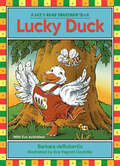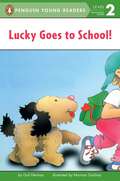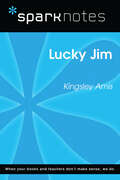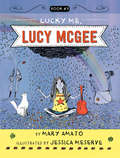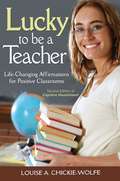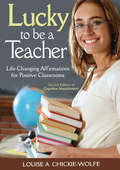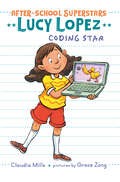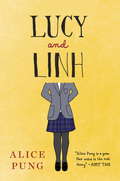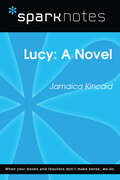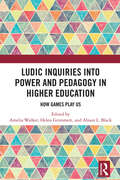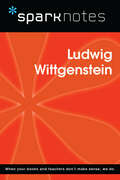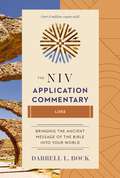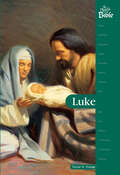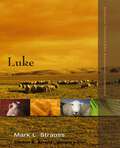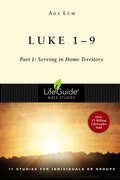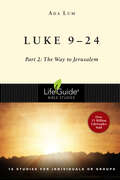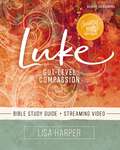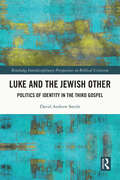- Table View
- List View
Lucky Duck: Short Vowel U (Let's Read Together ®)
by Barbara deRubertisLet&’s Read Together books merge rhyme and vowel sounds in delightfully zany stories kids will want to read again and again. Each of the 15 books in this classic series by award-winning author/educator Barbara deRubertis will give your child a jumpstart on reading success."Story lines are silly and inventive, and recall Dr. Seuss&’s Cat in the Hat for the building of rhythm and rhyming words." —School Library JournalLucky Duck gets stuck in a muddy puddle. Has this duck ran out of luck? (This easy-to-read story features the short &“u&” vowel sound.)
Lucky Goes to School (Penguin Young Readers, Level 2)
by Gail HermanWhen Lucky's owner goes to school, where will Lucky go? Who will he meet? Find out in this fun-filled Level 2 reader.
Lucky Jars & Broken Promises
by Chrissie Perry Hardie Grant EgmontPenelope tries to impress her father with her booth at the school fair in the third book in the charming Penelope Perfect chapter book series.Penelope Kingston is absolutely certain that her stall at the school fair will be a huge success. She and Oscar are in charge of the lucky jars, and Penelope wants to break last year’s record. This is even more important because Penelope’s dad is coming to the fair. She and her brother don’t get to see him very much these days so Penelope is about to burst with excitement. If she can make her dad proud, maybe he’ll want to spend every weekend with Penelope and Harry, her brother. She just has to make sure that everything goes perfectly…
Lucky Jim (SparkNotes Literature Guide Series)
by SparkNotesLucky Jim (SparkNotes Literature Guide) by Kingsley Amis Making the reading experience fun! Created by Harvard students for students everywhere, SparkNotes is a new breed of study guide: smarter, better, faster. Geared to what today's students need to know, SparkNotes provides: *Chapter-by-chapter analysis *Explanations of key themes, motifs, and symbols *A review quiz and essay topicsLively and accessible, these guides are perfect for late-night studying and writing papers
Lucky Me, Lucy McGee (Lucy McGee #3)
by Mary AmatoFourth grader Lucy McGee's ukulele is missing--and if she doesn't find it soon, she'll be kicked out of the Songwriting Club!Lucy McGee is determined to track down her beloved instrument, but she can't let anyone catch on--even best friend Phillip. When Lucy learns that YouTube songwriting stars Ben & Bee are playing a show on Saturday and they're giving away a free ukulele, it seems like the perfect solution. If only it wasn't the most in-demand, expensive concert ever.Soon frenemy Scarlett announces that she has an extra ticket to the show, prompting everyone in the Songwriting Club to try to win her over. Lucy McGee will have to get extra creative to find out what happened to her uke and to charm the always-scheming Scarlett in this humorous but heartfelt chapter book. The third book in Mary Amato's charming Lucy McGee series features artwork on every page as well as song lyrics for aspiring musicians to try out on their own.
Lucky Rat (Stairway Decodables Step 3)
by Leanna KochPam is competing in a gym show. She decides to sneak in her pet rat to bring her good luck, but he goes missing. Will she be able to find her lucky rat? Stairway Decodables is a supplemental phonics resource that’s perfect for supporting small group instruction, independent reading, or reading practice at home. This title provides practice in decoding words with consonant digraphs th and sh.
Lucky To Be A Teacher: Life-Changing Affirmations for Positive Classrooms
by Louise Chickie-WolfePositive affirmations guide the brain to positive thinking. This gem of a workbook inspires educators at all grade levels and points in their careers to strive for excellence every day. Louise A. Chickie-Wolfe expands on core motivating affirmations to help readers establish goals, deepen self-understanding, maintain a positive perspective in their work, and reinforce their commitment to teaching as a profession. Formerly published as Cognitive Nourishment, Lucky to Be a Teacher is an ideal gift for teachers to honor the essential work they do and help build the necessary resilience to stay in the field. Features include: • Thirty-three updated affirmations to encourage teachers in their pursuit of a positive classroom • Guided reflection questions with room for response to accompany each affirmation • Writing prompts to help teachers write their own affirmations Reignite the passion and drive that drew you to teaching as a career and reap the benefits of a positive outlook, an energized classroom, and joyful students!
Lucky to Be a Teacher: Life-Changing Affirmations for Positive Classrooms
by Louise A. Chickie-WolfeThis gem of a workbook expands on 33 affirmations and reflection questions to help readers establish goals, maintain a positive perspective, and remain committed to excellence.
Lucy Finds Her Way
by Nancy RueAs twelve-year-old Lucy prepares for the Olympic Development Program soccer try-outs, she struggles with the complexities of middle school, her relationship with her best friend, and Aunt Karen, who is trying to take over her life while her father is away.
Lucy Goes To The Fair: A children's book for boys and girls aged 6 and up
by A. P. HernándezThe fair’s finally here! Lucy and her brother Nick are ready to have a great time. Valentina, Lucy's best friend, is also going. They're looking forward to eating chocolate waffles and riding the Ferris wheel and the pirate ship. However, they're about to have an unimaginable adventure. What's inside? •A simple and fun narrative, perfect for first-time readers. •Relatable characters and everyday situations that children can easily identify with, making reading more meaningful. •A story with numerous illustrations, perfect for reading with the family.
Lucy Longwhiskers: Book 1 (Magic Animal Friends Early Reader #1)
by Daisy MeadowsWelcome to a magical world where animals talk and play - just like you and me!Best friends Jess and Lily love all animals. But when they follow a mysterious golden cat into Friendship Forest - a place where animals live in tiny cottages and sip dandelion tea at the Toadstool Cafe - their animal friends suddenly become much more magical!On their first adventure in Friendship Forest, can the two friends rescue adorable baby bunny Lucy Longwhiskers from the wicked witch Grizelda?
Lucy Lopez: Coding Star (After-School Superstars #3)
by Claudia MillsTalented Lucy Lopez finds her passion when she joins an after-school coding camp, but can her older sister come to terms with their shared hobby?Third-grader Lucy Lopez and her older sister Elena created the Let's Have Fun Club, where they designed their own badges to put in a handbook and make up lists of things they have to do to earn each one. But now Elena is spending most of her time coding on the computer and Lucy feels left out. She decides to join the after-school coding camp in the hopes that Elena will want to add it to their Let's Have Fun Club activities and it can be something they can do together. But when Lucy proves to be a natural, Elena is none too happy--why does Lucy have to do everything she does?Parents and kids on the hunt for a fun and informative book about coding need look no further! Perfect for fans of Judy Moody, Ivy and Bean, and Clementine, the After-School Superstars series of chapter books features recurring characters, and each book highlights one activity they do at their after-school program. With large black-and-white illustrations, each book includes a bonus activity related to that book's plot. Don't miss the other titles, including Nixie Ness: Cooking Star and Vera Vance: Comic Book Star. Lucy Lopez is being simultaneously released in hardcover and paperback.A Junior Library Guild Selection!
Lucy and Linh
by Alice Pung<p><i>Gilmore Girls</i> meets <i>Fresh Off the Boat</i> in this witty novel about navigating life in private school while remaining true to yourself. <p>Lucy is a bit of a pushover, but she's ambitious and smart, and she has just received the opportunity of a lifetime: a scholarship to a prestigious school, and a ticket out of her broken-down suburb. Though she's worried she will stick out like badly cut bangs among the razor-straight students, she is soon welcomed into the Cabinet, the supremely popular trio who wield influence over classmates and teachers alike. Linh is blunt, strong-willed, and fearless--everything Lucy once loved about herself. She is also Lucy's last solid link to her life before private school, but she is growing tired of being eclipsed by the glamour of the Cabinet. <p>As Lucy floats further away from the world she once knew, her connection to Linh--and to her old life--threatens to snap. Sharp and honest, Alice Pung's novel examines what it means to grow into the person you want to be without leaving yourself behind.</p>
Lucy and the Bully
by Claire AlexanderLucy is good at drawing and making things at school. But there's a bully at school, and he's very mean to Lucy. She can't tell anyone the bully rips her books and breaks her things, because he told her not to--or else. Now every day she comes home scared and sad. What can Lucy do? And who can Lucy tell? Claire Alexander's simple story and bright illustrations will help young children talk openly about bullying. Best of all, it will reassure them that bullies can be stopped. Claire Alexander lives in England, where she studied at the Kent Institute of Art and Design in Canterbury.
Lucy, Uncensored
by Mel Hammond Teghan HammondA road trip through gender identity, self-expression, and the thorny process of figuring out where you fit after high school as an out-and-proud transgender teen.Lucy imagines college as more than a chance to party with other drama nerds and be roommates with her best friend Callie. College will be her fresh start. For the first time, she'll be able to introduce herself as Lucy to people she hasn't gone to school with since kindergarten. Plus, she happens to live an hour away from one of the most prestigious theater programs in the country. She's always dreamed of going to Central, but when she finally has a chance to visit, it's not what she imagined.While Lucy and Callie are on their campus tour, two kids from their high school make the typical transphobic comments Lucy's gotten used to in her small town. She starts to worry that her dream school might end up being High School 2.0. What if she belongs somewhere else? Somewhere that she can truly have a fresh start?When Lucy finds a beautiful school with a great theater program on a list of the most LGBTQ+ friendly colleges, it seems like fate—except that the school is hundreds of miles away. And there's something unexpected about it: it's a women's college. As far as she can tell, they've never admitted a trans woman. Will they let Lucy in? There&’s only one way to find out: road trip!
Lucy: A Novel (SparkNotes Literature Guide Series)
by SparkNotesLucy: A Novel (SparkNotes Literature Guide) by Jamaica Kincaid Making the reading experience fun! Created by Harvard students for students everywhere, SparkNotes is a new breed of study guide: smarter, better, faster. Geared to what today's students need to know, SparkNotes provides: *Chapter-by-chapter analysis *Explanations of key themes, motifs, and symbols *A review quiz and essay topicsLively and accessible, these guides are perfect for late-night studying and writing papers
Ludic Inquiries Into Power and Pedagogy in Higher Education: How Games Play Us
by Alison L. Black Helen Grimmett Amelia WalkerThis book interrogates the role games and playfulness bear in both formal education and informal social learning. Responsive to contemporary social and ecological challenges, this book especially explores games’ interactions with social power. On one hand, games sometimes operate to reinforce ideologies that normalise social injustice and environmental disregard. On the other, games offer rich possibilities for questioning such ideologies and encouraging change.Strongly interdisciplinary, the book assembles 20 chapters written by 50 experts across fields including education, game design, cultural studies, sociology, Indigenous studies, disability studies, queer studies, STEM, legal studies, history, creative writing, visual arts, music, the creative industries, and social inclusion. These contributions not only make games a focus but incorporate playful research writing strategies, demonstrating methods of what we term ludic inquiry. This includes chapters written using arts-based research, practice-led research, poetic inquiry, narrative inquiry, autoethnography, duoethnography, and more. Organised across four themes – ‘philosophical sparks’, ‘lived experiences’, ‘pedagogical perspectives’, and ‘the spirit of play’ – this book emphasises the radical egalitarian possibilities inherent in critical attention to games and how we play (or get played by) them. Its fresh insights will interest all readers interested in creatively remaking our worlds.
Ludwig Wittgenstein (SparkNotes Philosophy Guide)
by SparkNotesLudwig Wittgenstein (SparkNotes Philosophy Guide) Making the reading experience fun! SparkNotes Philosophy Guides are one-stop guides to the great works of philosophy–masterpieces that stand at the foundations of Western thought. Inside each Philosophy Guide you&’ll find insightful overviews of great philosophical works of the Western world.
Luke (The NIV Application Commentary)
by Darrell L. BockThe NIV Application Commentary helps you communicate and apply biblical text effectively in today's context.To bring the ancient messages of the Bible into today's world, each passage is treated in three sections:Original Meaning. Concise exegesis to help readers understand the original meaning of the biblical text in its historical, literary, and cultural context.Bridging Contexts. A bridge between the world of the Bible and the world of today, built by discerning what is timeless in the timely pages of the Bible.Contemporary Significance. This section identifies comparable situations to those faced in the Bible and explores relevant application of the biblical messages. The author alerts the readers of problems they may encounter when seeking to apply the passage and helps them think through the issues involved.This unique, award-winning commentary is the ideal resource for today's preachers, teachers, and serious students of the Bible, giving them the tools, ideas, and insights they need to communicate God's Word with the same powerful impact it had when it was first written.
Luke (The People's Bible)
by Victor H PrangeWho was Luke in the Bible? Who wrote the book of Luke?Luke, a physician, traveled with the apostle Paul on his missionary journeys throughout the Greco-Roman world, sharing the message of Jesus. Luke carefully investigated the events in the life of Jesus and talked with eyewitnesses before he began writing his gospel account. His record emphasizes that Jesus is the Savior of all people and it was written specifically for new Christians who wanted to know more about Jesus.Want to learn more? If you’re wondering what the book of Luke is all about, this helpful resource is for you!Luke is a reliable Bible commentary. It’s down to earth, clearly written, easy to read and understand, and filled with practical and modern applications to Scripture.It also includes the complete text of the book of Luke from the NIV Bible. The Christ-centered commentaries following the Scripture sections contain explanations of the text, historical background, illustrations, and archaeological information. Luke is a great resource for personal or group study!This book is a part of The People’s Bible series from Northwestern Publishing House.
Luke (Zondervan Illustrated Bible Backgrounds Commentary)
by Mark L. StraussBrimming with lavish, full-color photos and graphics, the Zondervan Illustrated Bible Backgrounds Commentary walks you verse by verse through all the books of the New Testament. It’s like slipping on a set of glasses that lets you read the Bible through the eyes of a first-century reader! Discoveries await you that will snap the world of the New Testament into gripping immediacy. Things that seem mystifying, puzzling, or obscure will take on tremendous meaning when you view them in their ancient context. You’ll deepen your understanding of the teachings of Jesus. You’ll discover the close, sometimes startling interplay between God’s kingdom and the practical affairs of the church. Best of all, you’ll gain a deepened awareness of the Bible’s relevance for your life. Written in a clear, engaging style, this beautiful set provides a new and accessible approach that more technical expository and exegetical commentaries don’t offer.
Luke 1-9: Part 1: Serving in Home Territory (LifeGuide Bible Studies)
by Ada LumGood news! It was good news not only of Jesus' birth but of what he offered to men, women and children throughout his ministry. To the sick he offered healing. To the hurting, comfort. To the outcast, acceptance. In this eleven session LifeGuide Bible Study Ada Lum leads you to discover that this message of hope and joy is for you as well! This LifeGuide Bible Study in IVP's revised format features questions for starting group discussions and for meeting God in personal reflection, as well as a new "Now or Later" section following each session to help you act on what you learn. For over three decades LifeGuide Bible Studies have provided solid biblical content and raised thought-provoking questions���making for a one-of-a-kind Bible study experience for individuals and groups. This series has more than 130 titles on Old and New Testament books, character studies, and topical studies. PDF download with a single-user license; available from InterVarsity Press and other resellers.
Luke 9-24: Part 2: The Way to Jerusalem (LifeGuide Bible Studies)
by Ada LumGood news! It was good news not only of Jesus' birth but of what he offered to men, women and children throughout his ministry. To the sick he offered healing. To the hurting, comfort. To the outcast, acceptance. In this fifteen session LifeGuide Bible Study Ada Lum leads you to discover that this message of hope and joy is for you as well! This LifeGuide Bible Study in IVP's revised format features questions for starting group discussions and for meeting God in personal reflection, as well as a new "Now or Later" section following each session to help you act on what you learn. For over three decades LifeGuide Bible Studies have provided solid biblical content and raised thought-provoking questions���making for a one-of-a-kind Bible study experience for individuals and groups. This series has more than 130 titles on Old and New Testament books, character studies, and topical studies. PDF download with a single-user license; available from InterVarsity Press and other resellers.
Luke Bible Study Guide plus Streaming Video: Gut-Level Compassion (Beautiful Word Bible Studies)
by Lisa HarperPERFECTION NOT REQUIREDMany of us believe that we aren&’t good enough to meet other people&’s expectations. Maybe you can&’t wrap words around why, but lurking beneath the surface of the carefully curated façade you present in public, it&’s there. Being missed and marginalized by others moves us to assume we&’re not quite good enough for God either.The great news woven throughout the Gospel according to Luke is that perfection is not a prerequisite for a deep and personal relationship with Jesus. In fact, this riveting account reveals that Jesus is especially fond of ragamuffins in need of a safe place to lean in and linger! Join Lisa Harper in this Bible study of a literary masterpiece that doesn&’t celebrate the elite, but embraces the outliers, outcasts, and overlooked!This study guide includes:Individual access to eight streaming video talks from Lisa (232 total minutes of content)Group discussion questions and an opening group activity for each sessionIn-depth personal Bible study between sessionsReading plan through the entire Gospel of LukeScripture memory cards and coloring pagesSessions and Video Run Times:Outliers, Outcasts, and the Outrageous Mercy of God (26:00)Worship in the Waiting (25:00)Uphill Glory (29:00)Gut-Level Compassion (27:00) The Tender Heart of Obedience (32:00)A Beautiful Unbending (31:00)A Most Radical Restoration (31:00)A Tale of Two Rooms (31:00)This study guide has everything you need for a full Bible study experience, including:The study guide itself—with discussion and reflection questions, video notes, and a leader's guide.Personal study of Scripture and context.Scripture memory cards and coloring pages.An individual access code to stream all eight video sessions online. (You don&’t need to buy a DVD!) Streaming video access code included. Access code subject to expiration after 12/31/2028. Code may be redeemed only by the recipient of this package. Code may not be transferred or sold separately from this package. Internet connection required. Void where prohibited, taxed, or restricted by law. Additional offer details inside.
Luke and the Jewish Other: Politics of Identity in the Third Gospel (Routledge Interdisciplinary Perspectives on Biblical Criticism)
by David Andrew SmithLuke and the Jewish Other takes up the debated question of the orientation of Luke towards the Jewish people. Building on recent studies in the social history of early Jewish-Christian relations, it offers an analysis of Luke’s portrayal of Jewish and Christian identities that challenges the common assumption that the construction of religious identity in antiquity necessarily depended upon antagonistic relations with others. Taking account of the deep and often divisive difference that belief in Jesus made in Luke’s community, the author argues that Luke hoped to bring about both a rapprochement with and the conversion of contemporary Jews. Through this account of identity and alterity in the Gospel of Luke, the book cuts across boundaries of biblical studies, history, theology, and social theory, proposing a way forward for the study of Luke’s relation to Judaism and of the "parting of the ways" between Jews and Christians in the early Common Era.
